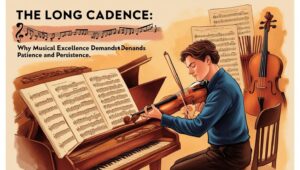by: Terrence Cummings

In today’s world of instant gratification, the art of music stands as a magnificent counterpoint. While streaming services deliver songs in seconds and viral videos create overnight sensations, true musical mastery remains steadfastly committed to a different timeline—one measured not in days or months, but in years and decades.
For families investing in their child’s musical education, this reality can sometimes feel at odds with the accelerated pace of modern life. When progress seems slow or motivation wanes, the question inevitably arises: “Is this worth continuing?”
At Tupelo Music Academy, we believe the answer is an unequivocal yes—not just for the musical skills developed, but for the profound life lessons that emerge from the journey.
Musical education represents perhaps the ultimate long-position investment. The dividends it pays—cognitive development, emotional intelligence, discipline, creative problem-solving—continue appreciating throughout a lifetime, regardless of whether your child ultimately pursues music professionally.
These advantages translate directly to academic performance and later professional success across fields from medicine to business leadership.
When the Path Gets Steep: A Personal Reflection
My personal journey reflection
I still remember the day I nearly walked away from music entirely. After months of struggling with a particularly challenging piece, frustration had overtaken my initial enthusiasm. The gap between my ambition and my abilities seemed insurmountable.
What kept me going wasn’t just encouragement from my teachers and family—though that was crucial. It was the realization that mastery in music isn’t about reaching a destination, but about embracing the journey itself.
Learning to memorize complex compositions didn’t happen overnight. It took me establishing systematic practice routines, developing memory techniques, and accepting that perfection wouldn’t come immediately. The countless hours spent practicing passages until my fingers moved intuitively across the instrument built more than musical skill—they built resilience.
When I eventually performed that piece for my band director, it wasn’t perfect. But the confidence I gained from persevering through difficulty proved transformative. This pattern repeated throughout my development as a musician: struggling as a band leader to inspire peers, facing rejection in the music business, encountering technical plateaus that seemed unbreakable.
Each challenge tempted me to quit. Each persistence built character. The leadership skills I use daily weren’t born from easy victories, but from pushing through when continuing seemed impossible.
The Marathon Mindset: Lessons from the Masters
Wynton Marsalis, one of the most celebrated jazz musicians of our time, famously practiced every single day for seven years straight—through school, holidays, and early professional gigs.
This wasn’t mere dedication; it was recognition that musical excellence operates on a timescale that defies shortcuts.
“If I don’t practice for a day, I know it,” goes the famous quote attributed to Jascha Heifetz. “If I don’t practice for two days, the critics know it. If I don’t practice for three days, the audience knows it.”
The principle extends beyond the practice room. Lang Lang spent years developing his technique before emerging on the international stage. Taylor Swift wrote hundreds of songs before her breakthrough hit. The Beatles played thousands of hours in Hamburg clubs before revolutionizing popular music.
Transforming Challenges into Opportunities
For families navigating the inevitable rough patches in a child’s musical journey, consider reframing moments of frustration as opportunities for growth. When your child faces a challenging piece or technique:
Acknowledge the struggle: Validate their frustration while emphasizing that difficulty is a sign they’re pushing their boundaries.
Break down barriers: Help them identify specific obstacles and develop strategies for overcoming them incrementally.
Celebrate persistence: Recognize effort and improvement, not just achievement.
Connect to larger goals: Regularly revisit why they began this journey and what music brings to their life.
Provide perspective: Share stories of accomplished musicians who faced similar challenges.
The Compounding Returns of Perseverance
What separates those who achieve musical excellence from those who don’t isn’t typically talent—it’s perseverance. This quality, cultivated through years of musical study, becomes one of life’s most valuable assets.
Harvard psychologist Angela Duckworth’s research on “grit” confirms what music educators have long observed: long-term success correlates more strongly with perseverance than with innate ability. By supporting your child through the challenging phases of musical education, you’re not just developing a musician—you’re shaping a resilient, determined individual prepared to excel in any field.
Investing in Tomorrow’s Leaders
When families consider the comprehensive development of their children, music education offers unique advantages. Beyond the cultural sophistication and artistic sensibility it develops, sustained musical training builds the precise characteristics that define successful leaders:
Discipline and focus: The ability to concentrate on complex tasks over extended periods
Emotional intelligence: Interpreting and conveying subtle emotional nuances
Collaborative skills: Working harmoniously within ensembles toward shared goals
Performance under pressure: Maintaining composure and excellence when stakes are high
Receptivity to feedback: Using constructive criticism to improve continuously
These qualities don’t materialize from a few months of lessons. They develop through years of consistent engagement with musical challenges, guided by knowledgeable mentors.
The Wisdom of Patient Investment
As your family considers the value of continuing musical education through challenging periods, remember that you’re not just choosing between continuing or discontinuing lessons. You’re deciding whether to embrace a developmental process that has shaped some of history’s most accomplished individuals.
The families who ultimately see the greatest return on their investment in music education are those who recognize its true nature: not as a series of quick achievements, but as a transformative journey that develops not just musicians, but exceptional human beings.
In music, as in life, the most worthwhile destinations are rarely reached by sprinting. They’re reached by those who understand the value of the long cadence—the patient, persistent journey toward excellence.
For more insights on nurturing musical development or to discuss your child’s specific musical journey, the faculty at Tupelo Music Academy is always available for consultation.

